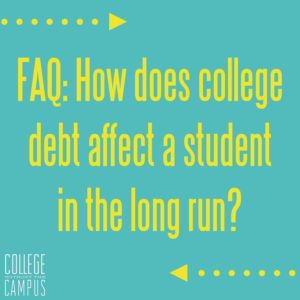Q: How does college debt affect a student in the long run?
A: First we must recognize that college debt can be acquired to fund not just tuition, but a particular lifestyle. “Students do not view debt exclusively as an investment, but also as a vehicle for consumption.”[1] Using debt, students can move out from home, join clubs that require monetary resources, and work less. Many students feel justified in utilizing debt because of the perceived freedom that this money provides: freedom to fully embrace the college experience. However, the consequences of this debt can affect the student for years.
In the same paper quoted above, the authors suggest that college debt affects when a person marries and has children. They also more strongly suggest that debt has an effect on buying a home and a car.[2] In 2014, The New York Times published a piece entitled, “The Ripple Effects of Rising Student Debt,” corroborating the influence of debt on home buying. They highlight research showing that people with student loans are less likely to purchase a home as well as start their own business.[3] In a Pew Research study, it was found that the median net worth ($64,700) of households headed by a young college-educated adult with no student debt was seven times greater than median net worth ($8,700) of households headed by an adult with student debt.[4]
Student loan debt has also been found to negatively affect individuals’ physical well-being and sense of purpose.[5] In 2014, Gallup-Purdue released a report studying more than 30,000 college graduates across the United States. In this index, well-being was separated into five aspects: purpose, social, financial, community, and physical. Debt negatively affected all five.[6]
[1] “Students do not view debt exclusively as an investment,” Steven Brint and Mathew Baron Rotondi, “Student Debt, the College Experience, and Transitions to Adulthood” (paper presented at the annual meeting for the American Sociological Association, Boston, July 31-August 4, 2008), 5.
[2] an effect on buying a home and a car. Ibid., 22-24.
[3] less likely to purchase a home Phyllis Korkki, “The Ripple Effects of Rising Student Debt” The New York Times, May 24, 2014, http://www.nytimes.com/2014/05/25/business/the-ripple-effects-of-rising-student-debt.html.
[4] was seven times greater This is a fascinating analysis of student debt’s effect on economic conditions of young Americans. Richard Fry, “Young Adults, Student Debt and Economic Well-Being” Pew Research Center, Washington, D.C., May 14, 2014, http://www.pewsocialtrends.org/2014/05/14/young-adults-student-debt-and-economic-well-being/.
[5] individuals’ physical well-being and sense of purpose. Allie Bidwell, “Student Debt Hurts More Than Your Wallet” U.S. News & World Report, August 7, 2014, http://www.usnews.com/news/articles/2014/08/07/having-high-levels-of-student-loan-debt-can-hurt-your-health-too.
[6] Debt negatively affected all five. Allie Bidwell, “Gallup: College Type Has Little to Do With Success” U.S. News & World Report, May 6, 2014, http://www.usnews.com/news/articles/2014/05/06/gallup-purdue-index-measures-the-magic-equation-to-student-success.
![]()

